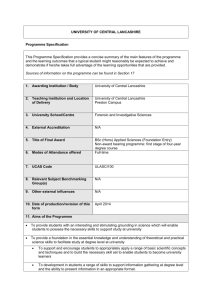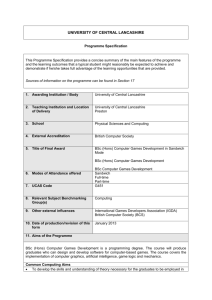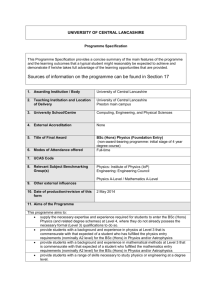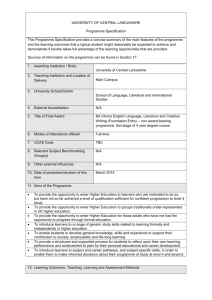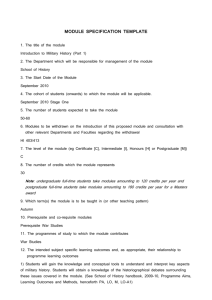bsc_hons_applied_investigation_foundation_entry
advertisement
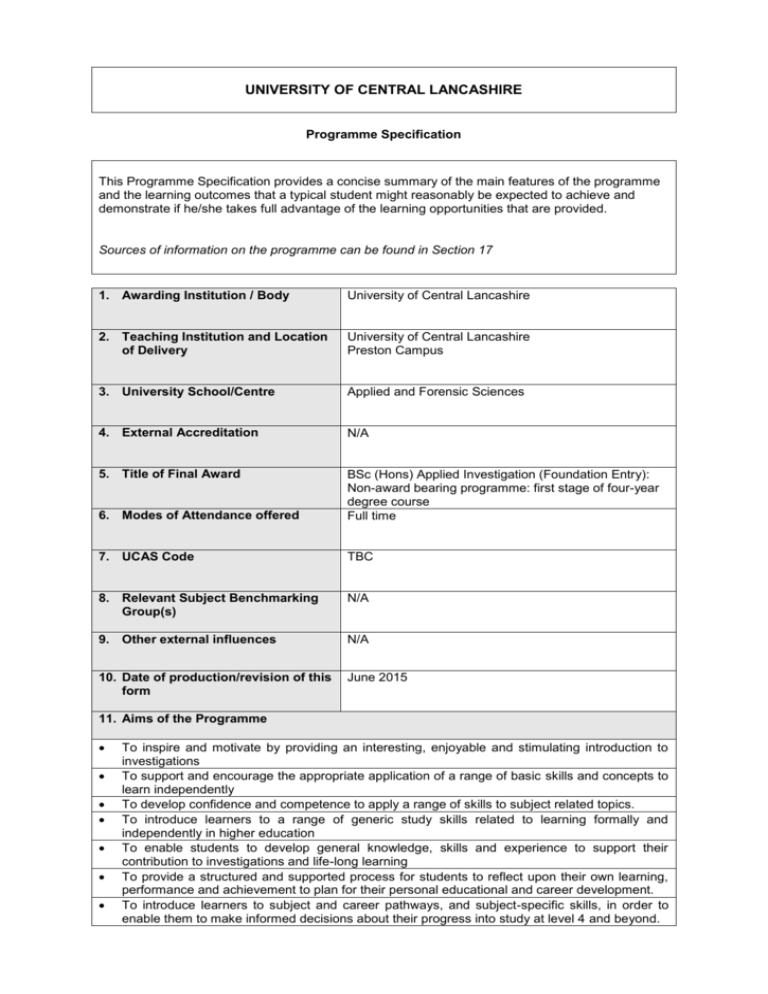
UNIVERSITY OF CENTRAL LANCASHIRE Programme Specification This Programme Specification provides a concise summary of the main features of the programme and the learning outcomes that a typical student might reasonably be expected to achieve and demonstrate if he/she takes full advantage of the learning opportunities that are provided. Sources of information on the programme can be found in Section 17 1. Awarding Institution / Body University of Central Lancashire 2. Teaching Institution and Location of Delivery University of Central Lancashire Preston Campus 3. University School/Centre Applied and Forensic Sciences 4. External Accreditation N/A 5. Title of Final Award 6. Modes of Attendance offered BSc (Hons) Applied Investigation (Foundation Entry): Non-award bearing programme: first stage of four-year degree course Full time 7. UCAS Code TBC 8. Relevant Subject Benchmarking Group(s) N/A 9. Other external influences N/A 10. Date of production/revision of this form June 2015 11. Aims of the Programme To inspire and motivate by providing an interesting, enjoyable and stimulating introduction to investigations To support and encourage the appropriate application of a range of basic skills and concepts to learn independently To develop confidence and competence to apply a range of skills to subject related topics. To introduce learners to a range of generic study skills related to learning formally and independently in higher education To enable students to develop general knowledge, skills and experience to support their contribution to investigations and life-long learning To provide a structured and supported process for students to reflect upon their own learning, performance and achievement to plan for their personal educational and career development. To introduce learners to subject and career pathways, and subject-specific skills, in order to enable them to make informed decisions about their progress into study at level 4 and beyond. 12. Learning Outcomes, Teaching, Learning and Assessment Methods A. A1. A2. A3. A4. A5. Knowledge and Understanding Describe the nature of applied investigations and their opportunities and challenges Describe and apply strategies for effective learning within an investigative process Identify personal strengths and weaknesses as learners Describe and apply basic investigation skills Evaluate their personal strengths and weaknesses as learners Teaching and Learning Methods Lectures and seminars, directed study of textbooks and online resources, tutorials, self-directed study, class discussions and workshops. Assessment methods Presentations, reflective journal, PDP portfolio and tasks, examinations, assessed seminars, essay and essay plan, personal statement, research project and online testing. B. Subject-specific skills B1. Prepare reports that reflect the nature and scope of one or more subjects in the area of investigations. B2. Engage with the challenges of an investigation in one or more contexts, sufficient to progress to study at level 4 studies in that discipline area. B3. Analyse results and interpret data and information Teaching and Learning Methods Lectures and seminars, directed study of textbooks and online resources, tutorials, self-directed study, class discussions and workshops. Assessment methods Presentations, reflective journal, PDP portfolio and tasks, examinations, assessed seminars, essay and essay plan, personal statement, research project and online testing. C. Thinking Skills C1. Engage with a variety of primary and secondary sources. C2. Evaluate the appropriateness of different approaches to solving problems related to their work as students C3. Conduct independent learning and research, including identification and evaluation of relevant primary and secondary source materials C4. Formulate and test selected concepts and hypotheses Teaching and Learning Methods Lectures and seminars, directed study of textbooks and online resources, tutorials, self-directed study, class discussions and workshops. Assessment methods Presentations, reflective journal, PDP portfolio and tasks, examinations, assessed seminars, essay and essay plan, personal statement, research project and online testing. D. Other skills relevant to employability and personal development D1. Demonstrate the attributes required to embark on degree level study D2. Work independently, or with limited guidance, where appropriate. D3. Communicate results accurately and reliably in writing, with structured and coherent arguments D4. Plan and conduct research, carry out independent analysis and present results. D5. Demonstrate basic skills of independent learning and research, including the ability to identify and evaluate relevant primary and secondary source materials Teaching and Learning Methods Lectures and seminars, directed study of textbooks and online resources, tutorials, self-directed study, class discussions and workshops. Assessment methods Presentations, reflective journal, PDP portfolio and tasks, examinations, assessed seminars, essay and essay plan, personal statement, research project and online testing. 13. Programme Structures* 14. Awards and Credits* Level Level 3 Module Code HUC110 Module Title Essential Study Skills for Higher Education Credit rating 20 (Comp) Successful completion of the BSc (Hons) Applied HUC111 Developing Academic Knowledge 20 (Comp) FZC071 Introduction to Forensic Science 20 (Comp) LWC003 Introduction to Current Legal Issues 20(O) FZC001 Investigation Project 20 (O) FZC012 Professional Policing 20(O) NTC001 Introduction to Geography and Environmental Management 20(O) FZC002 Archaeological Project 20(O) FZC004 Key Themes in Archaeology 20(O) FVC011 Intro to Eng. Analysis 20(O) HYC101 Introduction to History 20(O) Investigation (Foundation Entry) requires completion of 120 credits at Level 3. Successful completion of the year permits progression on to Year 1 of the following honours degree programmes: BSc (Hons) Policing and Criminal Investigation (requires completion of LWC003 ,FZC012, FZC001) BSc (Hons) Forensic Science and Criminal Investigation (requires completion of LWC003 ,FZC012 FZC001) BSc (Hons) Archaeology (requires completion of FZC004, FZC002 and HYC101 or NTC001) BSc (Hons) Fire and Leadership Studies (requires completion of LWC003 FVC011, FZC001) Students who exit after the Foundation year will receive a transcript of their modules and grades 15. Personal Development Planning PDP is delivered and monitored through skills modules and the personal tutor system. Students are provided with a PDP handbook in electronic format and are introduced to the idea by their personal tutor (PT). Their PT will then guide them throughout their time at university, both in constructing their PDP and in making sure that they are developing the right skills, helping them to identify and address any issues. Each student sees their PT six times a year for a small group tutorial where the PT and other students will discuss a particular skill or employability issue. Typically the student will have prepared a document or done a task in preparation for the meeting. These tutorials help students to identify and develop their skills and also encourage a culture of confidence between tutee and PT, so that if any specific problems arise with a student the PT will be in a position to assist. The PT topics are constantly reviewed and updated in response to current practice in the workplace and to feedback from PTs and tutees. PTs insist on seeing a completed PDP before writing references. 16. Admissions criteria Programme Specifications include minimum entry requirements, including academic qualifications, together with appropriate experience and skills required for entry to study. These criteria may be expressed as a range rather than a specific grade. Amendments to entry requirements may have been made after these documents were published and you should consult the University’s website for the most up to date information. Students will be informed of their personal minimum entry criteria in their offer letter. Entry to this programme requires DDD at A2 or equivalent and GCSE Maths and English at Grade C or above. International Applicants will be required to have a minimum level of proficiency in English Language equivalent to IELTS grade 6 with no subscore lower than 5.5. 17. Key sources of information about the programme University web site (www.uclan.ac.uk) UCAS web site (www.ucas.ac.uk) School website (www.uclan.ac.uk/forensic) Course Leader Bernard Sheridan Admissions tutor Bernard Sheridan 18. Curriculum Skills Map Please tick in the relevant boxes where individual Programme Learning Outcomes are being assessed Module Module Title Code Core (C), Compulsory Knowledge and understanding (COMP) or Option (O) LEVEL 3 A1 A2 A3 A4 A5 Programme Learning Outcomes Subject-specific Thinking Skills Skills B1 B2 HUC110 Essential Study Skills for Higher Education HUC111 Developing Academic Knowledge COMP FZC071 COMP LWC003 Introduction to Current Legal Issues NTC001 Introduction to Geography and Environmental Management FZC001 Investigation Project O O FZC002 FZC004 O O O O Introduction to Forensic Science Archaeology Project Key Themes in Archaeology FZC012 Professional Policing FVC011 Introduction to Engineering Analysis HYC101 Introduction to History Note: B3 C4 Other skills relevant to employability and personal development D1 D2 D3 D4 D5 C1 C2 C3 COMP O O Mapping to other external frameworks, e.g. professional/statutory bodies, will be included within Student Course Handbook
